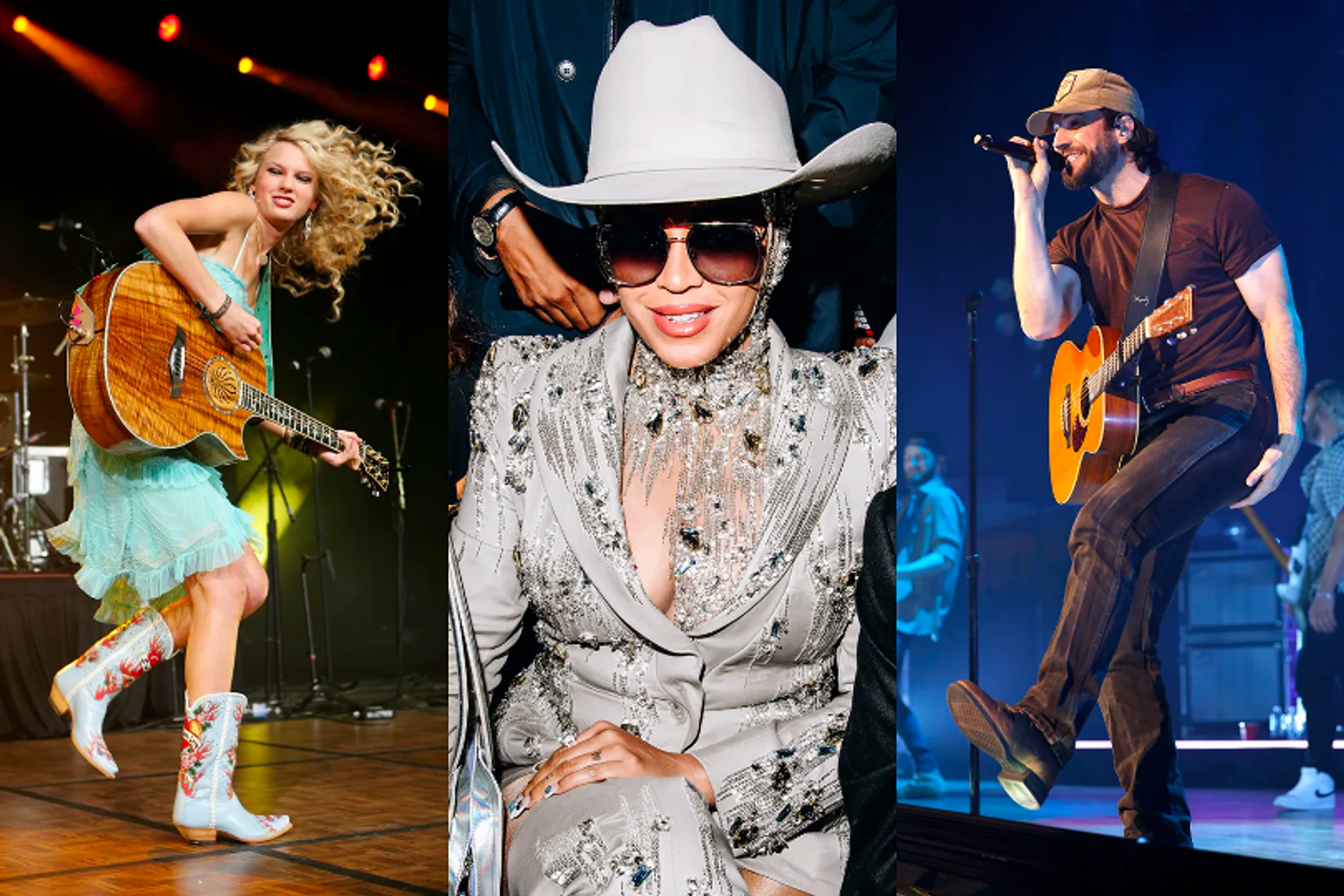
Max Gomez, Abby Kramer, Brian Principato
The Editor's Corner: The State of Country Music
Banner Image: Ethan Miller / Getty Images; Nina Westervelt/WWD; Jackson Kempin/Getty Images
The world of country music has been a regular rodeo lately, full of all the ups, downs, bumps, and bucks a wild horse ride has to offer. While some of the genre’s major players are leaning hard into deeply problematic themes, others are bringing fresh voices, tunes, and representation to the scene. The result? A full-fledged PR (and identity) crisis. This week, HL’s editors weigh in.
Max’s Take
Morgan Wallen’s “Last Night” was the first song in history to accumulate 1B streams in a single calendar year. New York’s hottest new party and the modern Studio 54 is a honky-tonk pop-up in Queens. Add in an uptick in western wear sales, and upcoming country releases from big artists, and it seems we’re in for a bit of a country renaissance, aesthetically and culturally.
But there are two sides to every story, and every cactus has its prickles.
The chart-topping track “Try That In A Small Town” from Jason Aldean launched a thousand think pieces last year, wading into the often icky politics that cloud the genre. Aldean, not from a small town, caught intense criticism for the arguably pro-lynching, ostensibly anti-Black anthem. Similarly, the sleeper hit “Rich Men North of Richmond” was quickly co-opted by right-wing listeners this summer, much to the chagrin of artist Oliver Anthony. There’s a lot that has created this bizarre moment, including an anti-boycott mindset from a conservative listenership and the widening gap in what the media understands about what average Americans consume.
Country music, like all music, is just a genre, a vehicle for messages and stories. All that glitters is not rhinestones— don’t write off heartland aesthetics as a fun, benign “era” to enter without considering the bad actors who will continue to lean on the storied genre for their stories, too.
Abby’s Take
While country music’s latest controversies and displays of overt racism have caused iconic stars like Maren Morris to take a step back from the genre, an unexpected emergence onto the scene has captured the nation’s attention – and could signal yet another turn in the tide for country’s broader reputation.
Queen Bey herself recently announced her first country album, titled Act II, set to drop on March 29th. The album’s two released singles — “Texas Hold ‘Em” and “16 Carriages,” have dominated the charts already, making Beyoncé the first Black woman to top the US Hot 100 with a country song.
As Billboard so accurately phrased it, “When Beyoncé says something, people listen.” The undeniable power of Beyonce’s music and the heft of her brand have popularized everything from the feminist movement to silver sparkly clothing in years past – and as we’re already seeing, her footprint on the country music genre is likely to be just as far-reaching.
As someone who grew up listening to (and admiring) country music’s most powerful women – from Dolly to Reba, Faith, Shania, and even debut-era Taylor Swift – it’s heartening to see another icon and role model stepping into a genre that seems to have lost its way. For the sake of country music (and its fans), I certainly hope Beyoncé brings the heat, the glitter, and the power ballads so many of us have been missing.
Brian’s Take
I grew up with a Bruce Springsteen dad and a Beatles mom. Country music was something I only came across during the odd family outing to a Texas-themed BBQ spot. But since leaving my city childhood home in DC for the great heartland (Michigan State University), I’ve been drawn to country music performers’ ability to pair a (sometimes too) relatable story with a delivery that’s deeply individual.
As an elder-millennial, I’ve also seen a divide grow between country music that expands what’s possible and country music resistant to any change whatsoever. It’s a dynamic that transcends the lyrics, performers, and listeners of the genre. And it’s something that is pervasive well beyond the six-string strumming on the tailgate of an old Ford during a cornfield party. In plain language, country music singers and very public stars have generated and perpetuated stereotypes, sexism, racism, homophobia, and antiquated views on social issues. I condemn it across the board, but it is a reality that remains sadly far from confined to country music and as American as apple pie.
On a positive note, the future of country music looks like Beyonce’s “Texas Hold ‘Em” and covers like Luke Combs’ raspy version of Tracy Chapman’s “Fast Car.” While the vibes and personalities who enter the genre will continue to change (for the better, in my country music fan opinion), country music will also retain the core of what brought it to the global stage: authenticity—and, on the backs of giants like Queen Bey, Dolly Parton, and others, the stories at the heart of this tradition will drown out negative elements with progress and diversity in time.
In Conclusion
Country music has long used constructed narratives about classic conventions like breakups and dive bars to touch on grander narratives about pride, poverty, and the anxieties of daily American life. It’s sad to see one of our greater storytelling mediums in such a crisis—and worse still to see so many in the media maligning the genre at large.
That said, with mainstays like Dolly Parton and powerhouse newcomers like Beyoncé at the helm, we remain hopeful that the genre will right itself where it’s gone wrong, and keep its heartfelt storytelling superpower front and center.
